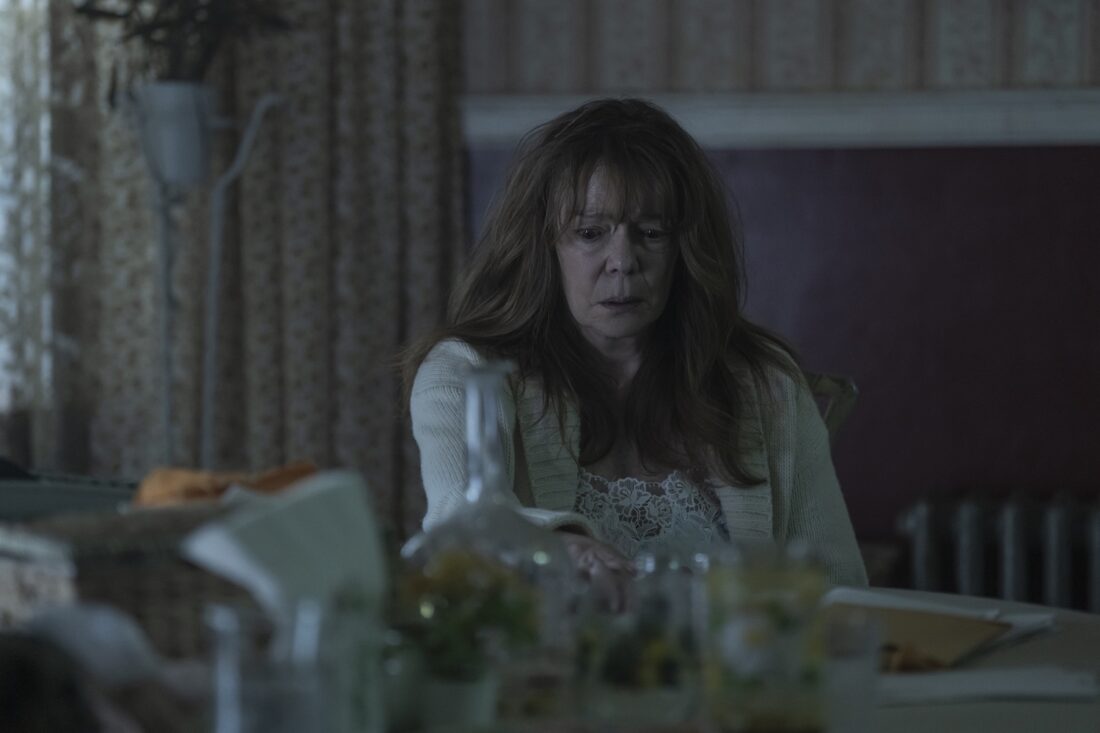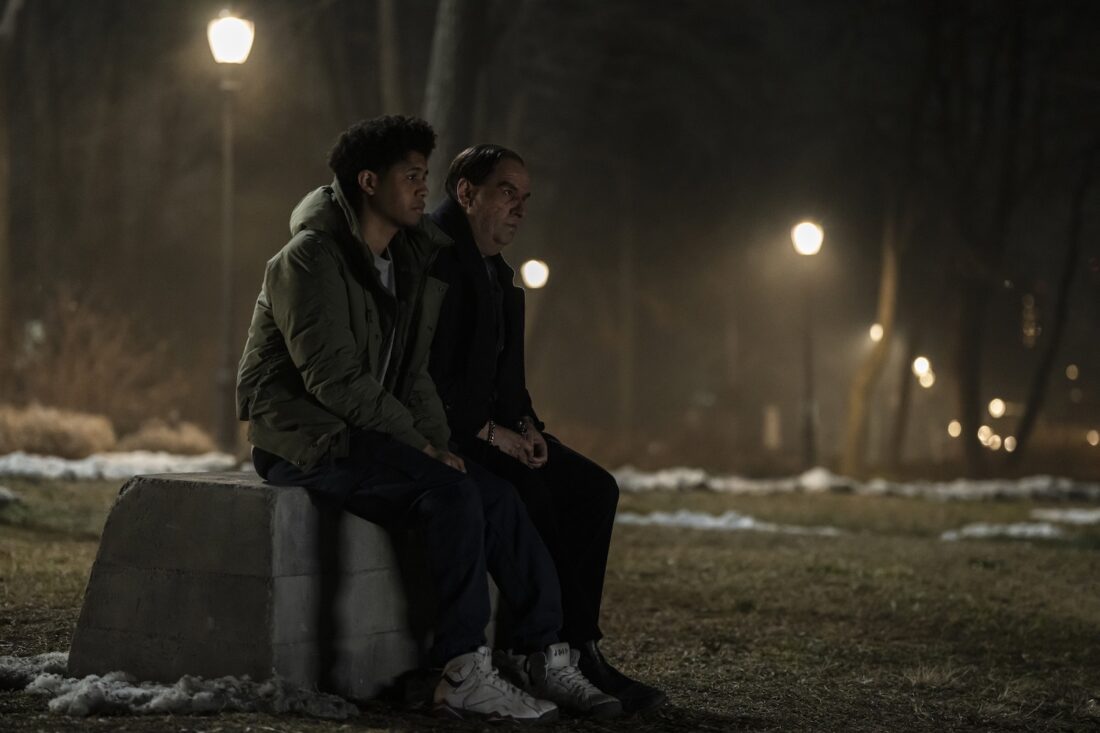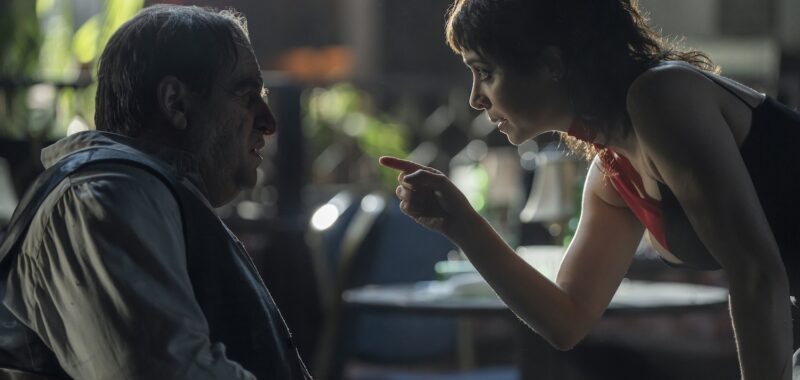Ultimately, it’s all about our parents.
Okay, that’s not all it’s about, but the central conflict of the eight episodes of The Penguin has boiled down to how Sofia Gigante has responded to her father’s abusive treatment of her (which we saw in great detail in “Cent’Anni”) and how Oz Cobb has responded to his mother’s abusive treatment of him.
That last is a twist that shows up at the very beginning of this episode. Throughout the series, Francis Cobb has seemed oddly ungrateful to her surviving son. He has moved heaven and earth to keep her safe, and worked hard to provide a better life for her—it’s clear that everything he’s done has been for her.
The twist, however, is that Francis has known all this time that Oz is responsible for the death of Jack and Benny, as we all learned last week. The trip to Monroe’s that Penguin told Sofia about at Alberto’s funeral in “Inside Man” and that we saw dramatized in “Top Hat” last week is revealed this week to have been meant to be Oz’s last night. Rex—the gangster for whom Francis did bookkeeping work—was going to “drive Oz home,” a euphemism for him getting whacked.
But Francis changed her mind. She decided to use her son—her brilliant monster of a son—to improve her life. She would always hate him, but she would gladly use his brains, his cleverness, his ruthlessness, his insightfulness (the moment where she changes her mind is when Oz enumerates how well he knows her, mentioning the smile she uses when she wants someone to think she’s happy, plus that she smokes more when she’s thoughtful and drinks more when she’s sad), and, most importantly, his utter devotion to his mother.
All this comes out in the remains of Monroe’s, trashed as so many other places in Gotham were by the Riddler’s destruction of the sea wall in The Batman. Sofia and her pet shrink Dr. Julian Rush have both Penguin and Francis prisoner. Thanks to Rush working his flashing-red-light mojo on Francis, both he and Sofia know the truth as well, and Sofia—wearing a sexy black dress with a red scarf and red pumps, looking like she should be performing at Monroe’s—wants Penguin to know the truth about his Mom.
But Penguin’s monstrosity is too great. Despite the fact that he’s tied up, despite the fact that Sofia threatens to cut off Francis’ pinky finger (the same one he cut off of Alberto when he framed Maroni for killing her brother in “After Hours”), Penguin refuses to admit that he killed his brothers. Instead, he insists that this memory of Francis’ is all a symptom of her Lewy Body Dementia, that she doesn’t know what she’s saying.

This entire scene is a masterpiece, with Colin Farrell constantly screaming both Penguin’s denials and his anger at his mother being mistreated; Cristin Milioti, dressed like she’s auditioning for Chicago, giving us a Sofia who is reveling in playing mindgames and ringleading this impromptu group therapy session; and Deirdre O’Connell showing Francis’ façade finally falling completely apart. We’d been assuming that the passive-aggressive snark she threw periodically at her son was just part of her dementia, but no: that was her true feelings poking through the mask she’d been wearing for decades.
Eventually, Francis breaks a beer bottle and stabs her son in the belly. The shock and pain of that act has a brutal effect on both mother and son. Penguin gets a surge of adrenaline and is able to break out of his bonds and escape with his mother. Francis, however, after seeing a hallucination of Jack and Benny (both dripping wet), suffers a debilitating stroke.
Penguin is able to escape, taking out one of Sofia’s thugs with a punch, then using said thug’s gun to lay down cover fire to get out of Monroe’s. Outside, he shoots Detective Wise (who’s too busy getting high on drops to be paying attention) in the head and takes his car.
And now the maneuvering begins, because Sofia still wants revenge on Penguin and Penguin still wants to be the big bad boss—which is gonna be hard with his entire Bliss operation having been blown to smithereens by Sofia last week.
What’s thrilling about this finale is that you find yourself rooting for Penguin because it’s his show and because Farrell is playing him with such incredible charisma, and then it catches in your throat, as it were. His constant harping on the plight of the less well-off rings very true and makes him sympathetic, but then the script takes the time to remind us what a spectacular piece of shit he is. He murdered his brothers and still denies that he was even in the same place as them decades later. Plus all the murders and drug-dealing and other fun stuff…
Vic gets to shine in this finale, too: when he arrives at Crown Point with all the various crime bosses (the army Penguin asked him to gather last time), it’s too late to help. There are cops all around, and Penguin’s probably dead. Vic tries to convince them to help, as Penguin helped them, and they’re all supposed to be partners, but his pleas fall on deaf ears.
Well, all but two deaf ears. Link, Zhao’s second in command, does hear Vic’s words, but he plays it close to the vest, waiting for the right moment.
For Sofia’s part, she wants out. Her epiphany last week has taken effect, and she wants to leave Gotham. She’ll give her resources and territories to whichever gang leader brings her the head of Oswald Cobb.
Meanwhile, Penguin goes to City Hall, and I was kicking myself watching this scene, because I should’ve seen it coming. Penguin’s shtick since 1941 has always been that he’s a planner and he’s often the smartest guy in the room. I should have guessed that he’d be able to turn the mess Sofia made of Crown Point to his advantage. He meets with Councilman Cady (the politician he intimidated into getting power back to Crown Point in “Gold Summit”), and tells him that the explosion was the latest salvo in a gang war between Sofia and Maroni. The proof: the center of the explosion will show the remains of Sofia’s car and Maroni’s body is down there, too. This is Cady’s chance to get in good with the incoming law-and-order-focused Mayor Réal.
Penguin goes outside to see Link and some of the Triads, seemingly taking him to Sofia for Zhao. But Vic’s words—which mirrored what Penguin’s been saying for eight episodes—affected, not just Link, but all the deputies, who all move to take out their bosses. Penguin has his army of second bananas, who all are getting their shot at being at the head of the table instead of begging for scraps in the kitchen.
Sofia meets Zhao at the airport, ready to fly away from Gotham and all this after killing Penguin. But then Link shoots Zhao and it all goes to shit for her. Penguin then drives her (“Just like old times, huh?”) to a spot just under the bridge. He has her turn around, and she thinks she’s about to be shot in the back.
This whole thing is beautifully shot and acted and framed and set up. Milioti and director Jennifer Getzinger show the resignation on Sofia’s face, as she knows she’s going to die and that it’s all over. When Penguin tells her she’s going to hell, she replies, “I’ll save you a seat.”
But then a helicopter spotlight hits her in the face and she hears sirens. Turning around, Penguin is long gone, but GCPD is there to arrest her.
When Penguin said she was going to hell, he wasn’t talking about the mythical place where damned souls go after they die. He was talking about Arkham.
Rush winds up back working at Arkham, er, somehow, and has contrived to be one of her caretakers. He brings her some mail, including a letter from a woman named Selina Kyle, who claims to be her half-sister. Reading the letter, Sofia, for the first time in a long time, smiles. And it’s a genuinely happy smile as opposed to the evil cat-about-to-eat-a-mouse smile we usually get from her. It’s a nice little continuity moment, these two women whose lives were so totally screwed up by Carmine Falcone bonding over long-distance.
Penguin then sits with Vic, and they share a happy drink. Vic is very grateful to Penguin for giving him a shot, giving him a new family. But Vic has seen Penguin at his most vulnerable, and he can’t allow that to stand, not if he’s going to be a big boss now. So he chokes Vic to death, takes the money out of his wallet (to make it look like a robbery gone bad) and tosses his driver’s license into the river (to make it take longer to ID him). In an episode full of great performances, we should not lose track of Rhenzy Feliz, who shows us Vic’s earnest pleading with the gang leaders, his devotion and loyalty and gratitude for Penguin, and his breathless expressions of shock as that devotion is repaid with cold-blooded murder.

Francis was right. Her son is a monster. And this reminds us.
In the end, Penguin gets what he wants, but it’s bittersweet. Francis is catatonic now, completely unresponsive. Penguin gets the penthouse apartment “with a view of the whole friggin’ city” that he promised Francis as a kid back during that fateful night at Monroe’s. Her bed is set up so she has that view all the time as she sits in her vegetative state.
In this final scene (which starts with Penguin parking a new purple—ahem, “plum”—car), our title character is wearing a tuxedo, looking more and more like the comic book character, as he goes up to check on his mother.
Then he dances with Eve, who is wearing the exact same black dress that Francis wore to Monroe’s all those years ago, which isn’t at all creepy, and asks her to say the two things that Francis has never once said out loud to her son in any of the eight episodes:
She loves him. She’s proud of him.
He’s on top of the world. He’s the biggest crime boss in Gotham, and nobody can stand in his way.
Right after that, we cut to an outside shot, with the bat-signal shining in the night sky to remind us that somebody will stand in his way.
It’s—um, not entirely convincing that all the stuff that’s gone down over these episodes has done so without any involvement of Bruce Wayne’s chiropteran alter ego. Sofia’s little bomb explosion (if nothing else) should’ve gotten the Bat’s attention. That last shot, at least, promises that the next movie will pick up where this leaves off.
The title of this finale comes from an Oscar Wilde poem, “The Ballad of Reading Gaol” (which, according to the “Inside Gotham” after-show, Farrell gave a copy of to show-runner Lauren LeFranc, who was apparently never told by Farrell or anyone else that “gaol” is pronounced the same as “jail”). Wilde wrote that poem about his experience in the prison at Reading, where he served two years’ hard labor after being found guilty of indecency. The specific sequence is about another prisoner about whom Wilde initially knows nothing specific, and he “was wondering if the man had done / A great or little thing.” The prisoner in question was a murderer, specifically Charles Thomas Wooldridge, who slit his wife’s throat. And who was in the same prison as Wilde, who was guilty of (checks notes) having sex with men.
Throughout this series, both Penguin and Sofia have done great and little things. It has gotten Penguin at the place he said he wanted to be, but without his mother or his best friend, both of whom he betrayed (though he’d never admit it in either case). It has gotten Sofia in her personal hell of Arkham, with only a hilariously unethical shrink on her side. (Theo Rossi has played Rush as a pure toady, completely obsessed with Sofia to the point of absurdity, the Harley Quinn to Sofia’s Joker.)
This has been a helluva ride, a superlative study of deeply damaged people, a colloquy on how those with money and power treat the people under them, and a brilliant examination of the damage that family can do—both the active damage of bad family and the more passive damage of the loss of good family. Farrell, Milioti, Feliz, and O’Connell give the performances of a lifetime here, and LeFranc and her team deserve a ton of credit for a gripping, fascinating series.
In particular, it does what adaptations do best: give us a new look at an old story. This is a different interpretation of an eighty-three-year-old character, but still one that is true to his roots from that 1941 story that introduced him: a strange-looking little man who is nonetheless cleverer than most of the people around him, and who uses that cleverness to advance himself in the criminal world.
I doubt there’ll be a season two—this feels very much like a standalone transition piece between the two Matt Reeves-directed films starring Robert Pattinson—but these eight episodes are an excellent bit of additional storytelling in this latest interpretation of Gotham City.

